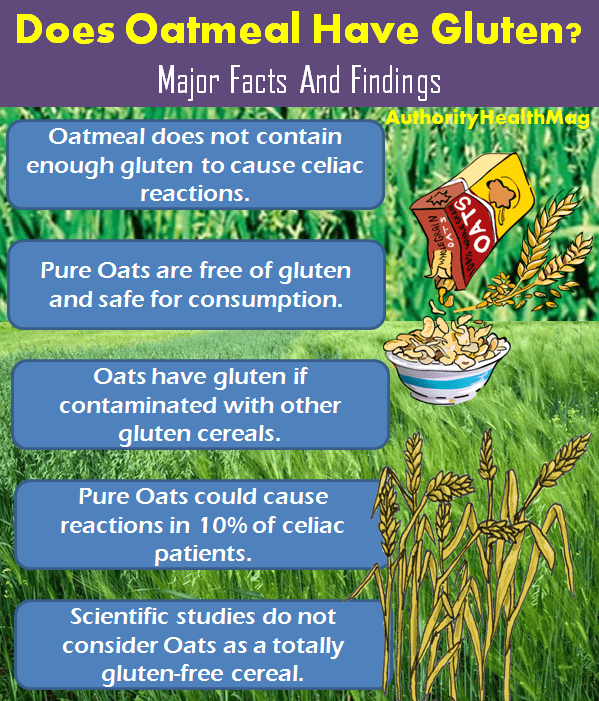Fear of celiac disease has made many people terribly ‘gluten paranoid.’ Symptoms of gluten intolerance may include constipation, fatigue, headaches, and nausea.
The oatmeal has also come under suspicion for the possible “sticky substance” from L. gluten (gen. glutinous) “glue” in it.
‘Is oatmeal free of gluten?” is a common question in all health forums.
Oats are the most preferred breakfast around the world. However, many people are apprehensive about the pros and cons of this delicious meal for their health, especially the gluten factor.
Most cereal grains contain gluten; oats also belong to the cereal family of foods, so it is natural to suspect this. In this article, we shall explore the actual gluten facts about oats.
Does Oatmeal Have Gluten? The Real Story
Pure oatmeal is a gluten-free diet. Uncontaminated oats are highly recommended as a safe diet for those who follow a gluten-free diet.
Most oatmeal packs sold by different brands today are not 100% pure. They are cross-contaminated with a small amount of wheat, rye, or barley.
According to several research reports, barley, wheat, and rye are classified as gluten-rich foods. Persons with celiac disease are advised to shun them. The oatmeal that contains a mixture of these grains is not gluten-free.
The most popular brands of oatmeal available on the market today are not safe for celiac patients. Others who consume it regularly have a possible risk of developing celiac disease in the future.
Some popular brands, like Quaker Oats, have a separate pack of labeled gluten-free oats.
However, the gluten-free status of oats and oat flour is highly controversial, and some health scientists disagree.
According to a few recent study reports, oats are naturally not gluten-free, but the level of gluten contained in them is negligible. The small quantity of gluten in oats does not cause inflammatory reactions in most people.
Reason For Mistaking Oats As A Gluten Grain
Is there gluten in oatmeal? This is an often-heard question that frequently comes up for discussion because of the wrong classification of grains.
The agricultural scientists of the past century grouped oats with wheat, barley, and rye because of their similarity. Later on, this non-scientifically established group of four grains came to be called ‘gluten grains’ traditionally.
However, recent research studies aided by modern technology have unjustified the classification of oats as ‘gluten grains.’
Some healthcare practitioners are still unconvinced about the recent study reports on oats. Like the other three, they continue to consider oats a gluten-free grain.
A few other healthcare practitioners clamor for considering a ‘gluten-free diet’ synonymous with a ‘wheat-free diet.’ Barley and rye do contain a lesser amount of gluten in comparison to wheat.
The gluten in oats is highly subjected to conditions. “Oats are inherently gluten-free, but are frequently contaminated with wheat during growing or processing.”
Do Oats Contain Gluten? From the Scientific Perspective
Recent scientific studies can give the best answer to your question, ‘Do oats contain gluten beyond the permitted amount?’
In the last few decades, several studies have evaluated the safety of oat consumption. Some of these studies are critical of the oat protein that can cause inflammation, especially in celiac patients. But these studies, in general, see oats as gluten-containing grains.
A comprehensive review of the medical literature published in 2011 compiles 75 studies published on “oats and gluten” since 1953.
Here are the key findings of the 75 studies in general:
- The oatmeal diet has high nutritional value, but it is not free of gluten.
- Contamination with prolamins in cereals, including oats, is frequent.
- A few clinical experiments suggest that a subgroup of celiac patients are also intolerant to oats.
- Oats with low avenin content are safe for celiac patients, but their reaction varies in all patients.
- Oats contain a form of protein known as avenin, similar to gluten, which adds up to 80% of the total protein found in oats. For this reason, oats can’t be gluten-free.
- The presence of 12–16% gluten in oats is deficient compared to the 69% gluten protein composition of wheat; for this reason, reports of adverse reactions in people consuming oats are very few.
- Gluten consumed at a concentration of as little as 20 ppm (parts per million) is enough to create an inflammatory reaction in celiac patients.
- Celiac patients remain ill even after giving up the traditional gluten diet.
- Developing assay methods to detect avenins in oat products with improved scientific methods is required to make the oats safe.
- Standard guidelines to be codified for the agricultural processing of oats and the manufacturing of oat products
- Current methods of testing the inflammatory response to oats by people with gluten sensitivity are inaccurate, and more advanced methods need to be invented.
- Currently, no scientific methods exist to extract gluten protein from cereals fully.
Are Whole Grain Oats Gluten-Free?
Whole grains are best for health as they are high in fiber, low in fat, and filling. Eating whole grains helps prevent diabetes, heart disease, and certain types of cancer.
According to healthy diet practices, 2/3 of our daily intake of grains should be whole grains.
Are whole-grain oats gluten-free? I’m sure that all oatmeal lovers are eager to get an answer to this common query.
All uncontaminated whole-grain oats are often gluten-free. Oats are most nutritious and healthy when taken as whole grains.
According to the University of Chicago Celiac Disease Center, oats are technically gluten-free as they are a different type of grain than barley, wheat, and rye, which contain the protein gluten. However, oats contain the protein avenins, a less harmful gluten variant.
Are Steel Cut Oats Gluten-Free?
“Groat” refers to cereal made from whole, hull-less oats, a Scottish word used for hundreds of years.
The steel-cut oats are the ‘whole oat groat’ split into pieces. It has a nutty and chewy flavor. This type of oat is diabetes-friendly as it spikes blood sugar levels, unlike highly processed oats.
Are steel-cut oats gluten-free? Technically speaking, they are gluten-free if they are made of uncontaminated organic oats. However, it may not be suitable for all celiac patients, as it might produce adverse reactions in some.
Are Rolled Oats Gluten-Free?
The rolled oats are traditional oat groats that have been de-husked, steamed, and then rolled into flakes under heavy rollers before being stabilized and lightly toasted.
Rolled oats get cooked faster than steel-cut oats because they absorb water quickly.
If rolled oats are your favorite, the answer to the question, ‘Are rolled oats gluten-free?’ is worth knowing.
Rolled oats are gluten-free if they are made of non-contaminated pure oats. Pure rolled oats are healthy and safe for celiac patients. However, rolled oats are a highly processed product with higher chances of cross-gluten contamination.
Is Gluten In Oats Bad For Celiac Patients?
Oats’ gluten differs from wheat and barley; 80% of the protein in oats is avenins, similar to gluten.
However, oats are safe for people with gluten sensitivity because they are easier to digest and less likely to cause adverse reactions.
According to studies, only less than a percent of celiacs are affected by the oats diet.
It is possible to grow oats that do not have any gluten cross-contamination. Organic oat is safe for most celiac patients, except for a few who might experience adverse reactions.
You do not need to give up eating oats if you only eat good-quality oats. However, the answer to the question ‘Is oats gluten-free?’ highly dependent on how oats are grown and processed.
The oats usually become cross-contaminated with gluten when grown in the same field as other gluten-containing grains.
Are oats gluten-free when processed in a multi-grain processing factory? No. If the oats are processed in the same facility that processes wheat, barley, or rye, the oats get cross-contaminated with gluten.
In short, from cultivation to the final level of processing and packaging, oats should not come into contact with any other gluten-containing grains.
How to Choose Healthy Oats
As we have already addressed the question, ‘Is oatmeal gluten-free?” let us see how to choose gluten-free oats.
If you have gluten sensitivity, you should only buy certified gluten-free oats. A vast majority of the oats sold on the market have cross-contaminated gluten. Here are a few tips on how to choose healthy oats:
- Make sure to buy oats without gluten contamination.
- Look for the label “certified gluten-free” printed on the packets of oats you buy.
- Look out for genuine customer feedback in online forums and reviews of the brand you intend to buy.
- Only buy regular oats from a manufacturer who adheres to standard practices for producing oats (total elimination of cross-gluten contamination in cultivation, harvesting, processing, and packaging).
- Look for brands that have had quality inspections and certifications by third parties.
- Check the ingredients label carefully to ensure no preservatives, flavorings, chemical sweeteners, or coloring substances are included.
- The sugar content should always be zero for oats; that label also has this detail.
- All types of oats have the same nutritional value, but ideally, buy steel-cut or rolled oats.
Which Oats Brands Are Safe?
For those who can tolerate oats, there is a good variety of gluten-free products on the market.
The top brands on the market that sell pure oats are:
Holly’s Oatmeal: It’s known to sell the purest oatmeal on the market, which contains less than 5 parts per million of gluten.
GF Harvest: The company grows its oats by testing the seeds it uses down to 3 parts per million. It has both regular gluten-free rolled oats and organic, gluten-free rolled oats.
Bob’s Red Mill: Have three types of gluten-free oats; quick-cooking, rolled, and steel-cut oats. Bob claims its tests for gluten are down to 20 ppm of gluten.
Arrowhead Mills: These steel-cut oats are naturally gluten-free, making them a superior product.
Glutenfreeda Foods: Sells certified gluten-free oatmeal.
Udi’s Gluten-Free: It’s certified gluten-free, and its products contain less than 10 parts per million of gluten.
Montana Gluten-Free: Sells high-quality oats directly sourced from farmers who follow proven methods to produce gluten-free oats.
You can also find several other companies that sell virgin oats, both certified and uncertified. You may choose any brand you prefer, but make sure to check the details of the brand before you purchase it.

Final Thought
“Is there too much gluten in oatmeal?” is an often-heard question, as oats belong to the cereal family.
Pure oats are healthy and safe for consumption, including for people with celiac disease. However, about 10% of individuals with gluten resistance also experience an adverse reaction to pure oats.
Technically speaking, oat is a gluten-free cereal, but going by the scientific analysis, all oats include a small amount of gluten. The negligible amount of gluten in oats may not cause a gluten reaction in most people.
Read next:
